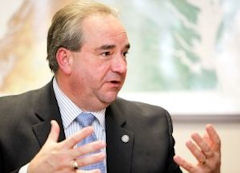by James A. Bacon
It sounds like Virginia Republicans have learned a lesson — at least temporarily — from the shellacking they took in the November elections. All the talk of “legitimate rape,” rape-induced pregnancy as a “gift from god” and, earlier this year, trans-vaginal ultrasounds has poisoned the Grand Old Party in the minds of thousands of voters who otherwise would be receptive to its message of limited government.
I believe that most Virginians belong, like me, to the “muddled middle” in the culture war, uncomfortable with positions staked out by extremists on both sides of the political spectrum. A majority of Virginians also are concerned that government has grown too big, too intrusive, too heavily in debt (at the federal level) and a hindrance to economic growth. But many, fearing that Republicans want to roll back the clock on gay rights and women’s rights, cast their ballots for Democrats instead.
It appears that Lieutenant Governor Bill Bolling has gotten the message, according to Jim Nolan writing in the Times-Dispatch. Speaking to a recent gathering of Republican women in Charlottesville, Bolling called for Republicans to learn the lesson from the election. “I’m a pro-life guy — I have always been a pro-life guy,” he said. “But I understand that within our party we have pro-life Republicans and pro-choice Republicans. Whether you’re pro-life or pro-choice there needs to be a respect of opinions on both sides of the issue.”
Meanwhile, other ranking Republicans have signaled a reluctance to resume the abortion fight. House Speaker William J. Howell, R-Stafford told Nolan: “There’s sort of a feeling that we’ve pretty much done everything that needs to be done.”
Sen. Stephen H. Martin, R-Chesterfield, said that the GOP-controlled Senate Education and Health Committee, which he heads, would not reconsider “personhood” legislation.
Bolling defended legislative initiatives in the 1990s and early 2000s that enjoyed broad public support, such as parental notification and consent to abortion, a ban on partial birth abortion, and higher patient safety standards for abortion clinics. But more recent initiatives have turned off voters. Republicans, he suggested, should pick different issues.
“Why aren’t we the party that champions efforts to reduce teen pregnancy in Virginia, which results in so many abortions? Why aren’t we the party that champions support for crisis pregnancy that helps women deal with unwanted or unintended pregnancies? Why aren’t we the party that does more to promote adoption as an option to abortion?”
Excellent questions, all. Republicans could frame such proposals as win-win initiatives that win the support of independents and Democrats. Unfortunately, Bolling this morning announced that he would withdraw from the 2013 governor’s race, depriving himself of a soapbox to advance those very causes. His decision effectively cedes the nomination to Attorney General Ken Cuccinelli, a firebrand cultural conservative.
In an interview with Nolan, Cuccinelli said that the GOP needs “to be open to people of different perspectives. … I think that the center of the Republican Party is one that favors life and protects it, but I don’t think we have — and we have to be cautious not to have — an exclusionary mentality for people with different views.”
It’s all well and good to say that the GOP should be a big-tent party. But how would Cuccinelli govern? Would he champion culture-wars issues that turn off the electorate? Or, as a small-government conservative, would he devote his energy to holding the line on taxes while preserving essential state government services? Would he be willing to tackle the deep, structural challenges facing Virginia — the crises in declining economic competitiveness, K-12 education, higher ed, health care, transportation and land use — or would he just paper them over?
We won’t know the answer until 2014 — assuming Cuccinelli assuages voter fears of his deep-rooted cultural conservatism and manages to win the election. Until then, we can at least console ourselves that we should get a break from the culture wars in the 2013 General Assembly session. The big question, then, is this: If the culture wars are off the table, will legislators have anything else to discuss?




